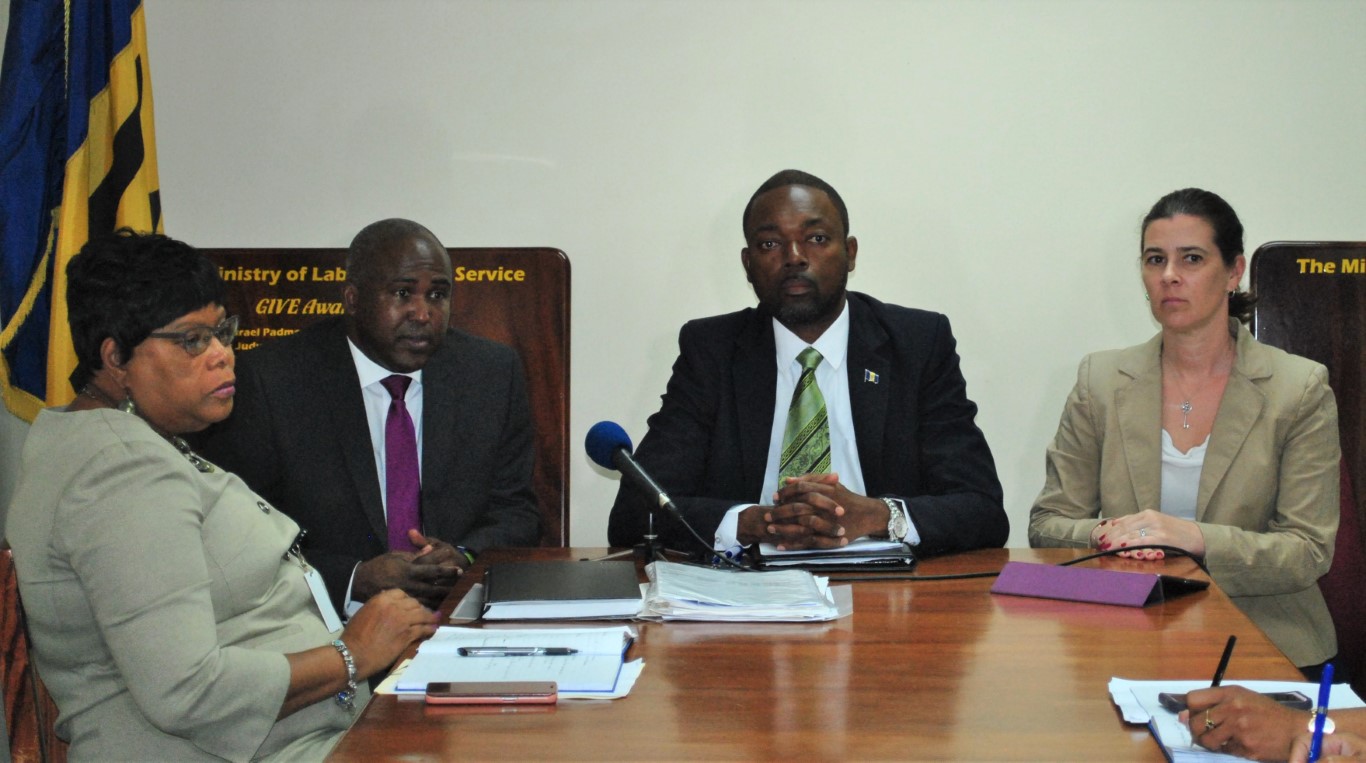By April 2020, 50 Barbadians will be off to the United Kingdom (UK) to work in the first ever UK Farm Labour Programme Barbados has signed on to.
This opportunity follows recent talks between the Ministry of Labour and Social Partnership Relations and international charity, Concordia UK, which were started last year through Barbadian-born Cristopher Griffith, consultant with CJMM Consultants Associates Ltd. Mr. Griffith is also Barbados’ representative for the Migrant Labour Pilot Programme in the UK.
For the past 50 years or more, Barbadians would have made their way to Canada to work on the Seasonal Agricultural Workers’ Programme.
Now, the UK is expected to be a second option for those men and women who don’t mind labouring in cold climes, or being away for lengthy periods, spanning six months and over. Like the Canadian Labour Programme, it is being facilitated by the Ministry’s Barbados Employment and Career Counselling Service.
At a recent media briefing to announce the partnership and express his gratitude, Minister of Labour and Social Partnership Relations, Colin Jordan, noted that the new initiative, a pilot programme, would be taken full advantage of, since it would build on the relationship which Barbados has with the UK.
Minister Jordan said: “We see it as an opportunity for workers to earn a living; for our workers to be ambassadors for the country and to share in another culture …. We also see it as an opportunity for workers, and the country, through those workers, to earn foreign exchange and possibilities for skills transfer.
“Barbadian workers have the advantage of a very good educational system, a good work ethic and we have the added benefit of the exposure of the Canadian Seasonal Agricultural Workers’ programme.
“So, there are many Barbadian workers who have experienced working outside of Barbados, particularly working in climates that are a little colder.”
The Minister’s views on the quality of the Barbadian worker were substantiated by the Chief Executive Officer (CEO) of Concordia UK, Stephanie Maurel, who spoke about the selection of the 50, as she acknowledged the partnership had come about through six months of hard work of auditing and getting licences and other things in place.

Ms. Maurel said after interviewing a high number of Barbadians, Concordia was excited about the “high quality” of people they had encountered and who were “ready to go, and could be in the UK as soon as early April”.
Adding that the original agreement had been to bring 50 workers in 2019, she said the British Government, having now announced (on February 19) that the pilot scheme would move from 2,500 to 10,000 persons this year, is now affording Barbados further opportunities to send more workers to the UK.
“It’s a huge jump, and really we are grateful to the Government for seeing that the need in the sector is acute, which agriculture desperately needs, workers from outside the European Union. Also, that they trust us, Concordia – that we can manage the temporary immigration scheme with workers coming in and out of the UK to work on the farms.
“Concordia works with about 200 farms in the UK, and because we are a charity, we really do work with the most ethical farms; we audit them ourselves, several times a year, and we really do check that any worker that goes anywhere, through Concordia, will go to excellent places on excellent farms, working on edible horticulture,” the CEO said.
“We see it [the UK Farm Labour Programme] as an opportunity for workers to earn a living; for our workers to be ambassadors for the country and to share in another culture …. We also see it as an opportunity for workers, and the country, through those workers, to earn foreign exchange and possibilities for skills transfer.”
Minister of Labour and Social Partnership Relations, Colin Jordan.
Meanwhile, Mr. Griffith, the initiator of talks between Barbados and Concordia UK, stated that he had watched the trends after the 2016 Brexit referendum.
On realizing that farmers were really concerned about the level of the labour force because European workers had started to leave and others did not want to come to the farms, he approached Concordia, following the announcement that there would be a pilot programme.
“I think fortunately enough Concordia was very keen to speak to me; we initially then had a discussion. I met Stephanie in London and we talked about the situation and what was potentially possible, and then from there I made contact with the local government. I thought it was good to speak to people here about what would be possible and eventually we got to this stage now where Barbados is the only English-speaking country that is in the pilot programme. So, I think that is really something we should shout about in terms of what they (the British Government) allowed to happen. So, here we are amidst a very distinguished group of countries …. There are Moldova, Ukraine, Russia, and Georgia and then Barbados.”
Agreeing that the additional quota for importation of overseas labour was a positive, Mr. Griffith said the agricultural sector was the only sector that had been allowed to continue to bring in non-English workers into the UK.

“So, it’s a lot of faith in the sector and Barbados is now going to benefit from not 50 workers, but potentially a lot more, as long as we can supply them and the Barbadian workers show themselves able, which I am happy to really believe they will ….
“I do think people want to take advantage of the opportunity; things here are not as buoyant as they used to be, so they are a lot of people who are very well qualified, but they don’t have anything to do …. I do believe that they would make Barbados proud and would make the farmers then realize that they can trust us,” he stressed.
The pilot programme in the UK will last for six months, with the first batch of labourers expected to work in edible horticulture – harvesting strawberries, raspberries, blueberries, herbs, potatoes and mushrooms, as well as protected vegetables grown in greenhouses.
There will also be opportunities available to those with Barbadian Driving Licences, given the shortage of tractor drivers in the UK, and the fact that big farms will require drivers to transport the labourers.
Mr. Griffith said opportunities were opened to both genders. “The main thing people needed to understand was it’s going to be work in an agricultural setting outside, and potentially you just need to be physically fit to do that. Concordia generally encourages a 70-30 gender balance, so there is a lot more opportunities for females.”
He added that among the 50 Barbadians, they might be five or six females.
Barbadian workers can also expect an added benefit once their performance remains of a high quality and they maintain an excellent attitude like many of their counterparts, who have journeyed to Canada.
The workers were reminded of this by Labour Minister Colin Jordan, who said: “Once you work well and farm owners recognize that, they will request you. If you work well, then there is longevity in terms of the opportunity.”







